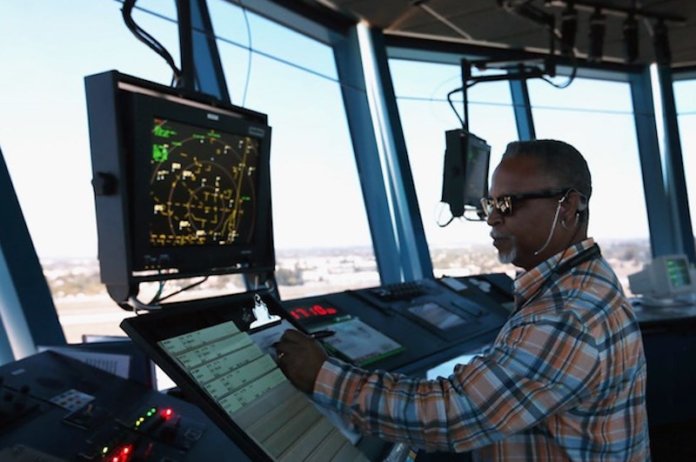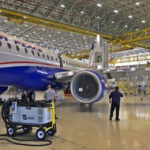
Protesting Air Traffic Controllers on Tuesday disrupted flight operations and insisted on improved welfare and better working tools.
Air traffic controllers were stung with pain and grief after they lost one of their own, the late Mr. Aniekan Effiong Inuk who slumped while on duty in the early morning of Monday, November 22, 2021 at the Abuja Approach Radar Control (TRACON).
In quick reaction, the controllers under the aegis of Nigerian Air Traffic Controllers’ Association (NATCA) held a meeting that same Monday and on Tuesday issued a statement and decided to take action by disrupting flight operations with what they referred to as Flow Control, which is gradual delay of flight start-up. That was before the intervention by the management of the Nigerian Airspace Management Agency (NAMA), which urged the controllers to suspend the flow control and the planned strike.
In a press statement signed by the NATCA President, Abayomi Agoro and the General Secretary, Agbonla Felix, the controllers observed that within the last two years, Nigerian Air Traffic Controllers Association had lost nine of her members in active service, “due to stress related health complications which seem associated with poor working conditions and inadequate staffing.”
The controllers said they had made several appeals to management and other stakeholders in the industry and inactions by appropriate managers on communiqués from the association’s past Annual General Meetings, had failed to address the issues.
“The death of Inuk, while on duty at the Abuja airport whose sad event is not unconnected with unavailability of operational vehicle to move him to a hospital in record time amongst others, is one too many. Hence, Air Traffic Controllers (ATC) are embarking on a three hours flow control for two days, 23 and 24 November, 2021 from 0600UTC to 0900UTC to register our displeasure and call the attention of relevant authorities and the public to quickly address our concerns without further delay,” the statement said.
Demands
NATCA demanded, “as a matter of urgency”, the NAMA management and relevant authorities to immediately implement all listed requests, which include that fully dedicated operational vehicles be provided to Air Traffic Control for the four major airports in Nigeria (Abuja Lagos, Port Harcourt and Kano) and to any other airport where ATC operational vehicle is critically needed.
The body also requested that that ATC Operational rooms are provided with adequate and quality ATC operational chairs and headsets and that at least 500 controllers be recruited to address the critical dearth in ATC manpower within the next two years, starting with 70 recruits within the next three months.
The controllers also demanded the approval and implementation of 500 per cent upward review of the annual ATC medical allowance to enable the controllers carry out comprehensive medical assessment among others.
They also requested that all controllers be enrolled in an enhanced comprehensive health and life insurance schemes that would meet their health needs.
That standard medical emergency kits be provided at all ATC units and a yearly Health Safety Environment (HSE) training programs for ATCOs be conducted and that all ATC communication facilities and equipment, most especially, the VHF radios and SATCOM (satellite communication) links be holistically rectified in other to address the perennial communication problems encountered in Nigerian airspace.
Other demands include that the staff deployed to ATC from other departments who have been stagnated on the same grade level for over seven years be placed on their appropriate grade levels having fulfilled all requirements to be Air Traffic Controllers and that all appropriate managements should immediately approve and implement an upward review of the remunerations of contract ATCOs to make for them to earn Aerodrome and Approach rating allowances.
“That the appropriate management should immediately liaise with the Federal Ministry of Aviation and other relevant government bodies to correct the anomalies observed in the recently approved ATC Scheme of Service to allow for implementation in a bid to eliminate the stagnation of Air Traffic Controllers.
“That the appropriate management should immediately liaise with the Federal Ministry of Aviation and relevant government bodies to ensure ATCOs retire with their full monthly salary as pension, ”the controllers said.
Suspension of Services
The controllers have threatened that if their demands were not met they could embark on strike action.
According to them, “Consequent on the above submissions, the association gives an ultimatum of two weeks commencing from the date of this press release for the above demands to be addressed otherwise we cannot guarantee industrial harmony. We want to advise all our members to remain calm as no stone would be left unturned until our demands are fully addressed.”
However the NAMA management has intervened. In a statement issued by NAMA and signed by the Managing Director, Captain Fola Akinkuotu, the agency said, “The Nigerian Airspace Management Agency hereby wishes to inform the general public that following the intervention of NAMA management, normalcy has been restored, as the Flow Control, earlier embarked upon by members of the Nigerian Air Traffic Controllers Association today, the 23rd of November, 2021 has been suspended. The above suspension is to pave way for a follow-up meeting between NAMA management, Director General of the Nigerian Civil Aviation Authority (NCAA) and the association, scheduled to hold later today.”

Improving Controllers’ Welfare
Air Traffic Controllers have over the years demanded that their working condition be improved and because of the stress of the job they do, its critical nature, due attention should be paid to their welfare. They also at various fora complained about the inability of NAMA management to upgrade or replace depreciating working tools in other to enhance their job.
THISDAY findings also revealed that there is inter department rivalry in NAMA, which tended to breed animosity that any time the controllers demanded for improved welfare, it triggers agitation among other departments.
There is also on-going imbroglio in aviation agencies about the dichotomy between technical personnel whose duties are crucial to air operation and administrators who insist that every training given to the technical personnel must also be extended to them. In fact, this has remained a butt of controversy; that at the Nigerian Civil Aviation Authority there was documented protest by the technical personnel, especially the inspectors who demanded that they should have different training and retraining progamme from the administrative personnel with the attendant remuneration.
THISDAY spoke to the former Managing Director of NAMA who was also former CEO of Aero Contractors, Captain Ado Sanusi.
Reviewing issues concerning Air Traffic Controllers, Sanusi said that the controllers’ welfare demand must be addressed because their job is very vital in the safety of air transport in the country.
Sanusi also said that the welfare of the controllers is paramount, noting that they need absolute concentration while doing their jobs and the industry cannot afford any mistake from them because such mistake could be tragic.
ICAO Regulation
Sanusi also said that the International Civil Aviation Organisation (ICAO) regulation has a guideline on the working environment of controllers, which ought to be domesticated and possibly improved on to make the controllers bring out their best.
“When I was there I encouraged exchange programme for the controllers. Their work is intensive and stress inducing so they should be given needed incentives. Even Heathrow airport that has fully automated system, the controllers’ work for one hour or at most two hours and some airspace management divide their work system into sectors in order to have more controllers.
“The challenge is that ATC in Nigeria are not many. When I was there we tried to move them from the normal civil service structure so that we can place them on better remuneration and welfare but such must pass through National Salaries, Income and Wages Commission.
“There are good a number of controllers that have done their medicals but cannot work because of age. I think we should be able to still keep those ones in service and also engage new ones. It is extremely important to have good working environment and regular medical check-ups. I hope there would be full investigation to the death of the controller,” he said.
On training, Sanusi remarked that training for the controllers should be continuous and constant.
“I believe they should be removed from the service structure. The challenge I had then was that if you approve ATC for training, others will say they want to go too. But their training is mandatory for safety. Their working tools have to be improved. Hopefully they are working to modernise TRACON. They should also do so with the control towers. They must be equipped in order to mitigate stress in their jobs,” Sanusi said.
Controllers’ Well-being
Former NATCA President, Victor Eyaru, who is now instructor at the Nigerian College of Aviation Technology (NCAT), Zaria, told THISDAY that during the peak period, which is morning and afternoon, a controller ought to work for one hour before he is relieved but because of shortage of manpower, a controller could work for two hours or more, which contribute to their health challenge.
He said that the industry needs at least 800 controllers, taking cognizance that some working now would be due for retirement and agreed with Captain Sanusi that the controllers should be taken out of the civil service structure.
“Even when Sanusi was our Managing Director he towed that line, but I know that it will not be easy to implement but we have to start by pushing it through the establishment by making the proposition that controllers should have their own structure,” he said.
Eyaru also stressed the need to review the template with which NCAA conducts medical examination to know the health status of Air Traffic Controllers. He wondered why some of the controllers are certified in terms of health; yet, they suffer sudden death while on duty.

“If there is proper template; when I am sick doctor should tell me my problem. This is NCAA area. Controllers should sit down with doctors and be comprehensively examined. Currently there is no special health insurance cover for the controllers, but there is need to have special health insurance cover; not the National Health Insurance Scheme, which the controllers are joining,” he said.
A former top official of NAMA described what happened on Tuesday as dangerous and noted that if NAMA management was “up to its game” it should not have happened. He noted that the agency needed to be more efficient and prioritise the welfare of those personnel who make invaluable contribution to the sustenance of safety in the airspace.
He also observed that there is high turnover of top officials, noting that the Director of Operation in NAMA, Lawrence Pwajok, would be retiring early next year.
culled from THISDAY






